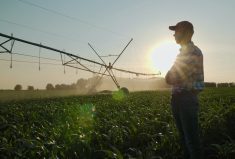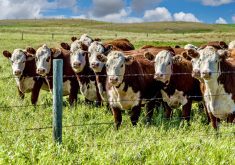“As a farming community we should be the epitome of health.”
That was the closing remark of one of the speakers at the Nuffield Triennial Farming Conference in southern England earlier this summer.
The speaker had been talking about obesity and food-related health issues, and how farmers could be a solution to this serious problem.
As most health issues can be traced to the gut (where 90 per cent of our microbe DNA resides), it is an important consideration for the future of farming. How do we farm health?
Read Also

From MasterChef to ‘Barndominium’: Rootstock Ranch fires up the grill
Marianne Smeaton, from Charlie Lake, B.C., is opening an event centre with a menu featuring her homegrown Wagyu beef after appearing on MasterChef Canada’s finale.
It is true that food-related health issues such as obesity and diabetes are epidemic in North America and in many developed countries (nearly 70 per cent of Canadians are considered overweight) while 13.5 per cent of the world’s population remains severely undernourished.
Is it fair to cast the net so wide that farmers are seen as antagonists in the sugar and fat drama? Are we certain that farming is a contributor to these ailments?
- More with Brenda Schoepp: Eating with our eyes — our perception of food isn’t a simple thing
Looking at it from a technical perspective, it is the diet of folks that gets them in trouble and that diet is a choice based on their environment and the information they have. That choice is also influenced by all the senses that we talked about in the last column and some very aggressive advertising. Take a walk down the aisles of a grocery store. Only the outer ring has meat, vegetables and fruit. The gut of the store is filled with processed product.
I asked grocery store workers what they saw when folks went through the checkout and the one comment that was repeated was, ‘There is pop or sweetened drinks in almost every cart.’
What has that got to do with farming (other than sugar and corn producers)? How can farmers be held accountable for this choice?
I don’t believe food producers are responsible for this choice, but they are in a unique position to offer consumers something more than empty calories. After all, they are a trusted source of information — in a survey last year, the Canadian Centre for Food Integrity found 69 per cent of consumers trust farmers (with trust being defined as shared values).
What does this mean?
Fresh, healthy food is what comes from the land and the animals on it. Simply put, farmers raise the solution to a nutritionally balanced diet every day. What they don’t get is recognition as the source of that nutrition because the linkage is weak or does not exist. And though there is no shortage to the dialogue on what we should not eat, when it comes to meat or conventionally raised crops including fruits and veggies, there is little evidence to support the claims. (Remember when eggs would kill you? That is no longer the case as the claim was based on evidence that supported the treatment of high cholesterol.)
That leads to the next question: Are governments determining what we eat?
When there is little value-added production in a country and trade deficits abound in food, this reflects a desire for a stronger trade agenda over a nourished nation. Farmers should not be the victim of food importation that devalues domestic product. Rather, because of our highly trusted food production system in Canada, extra value should be added here and the nutritional value shared. Our high standards set us apart, but we lose that advantage in volume pricing of commodities — rather than pricing based on standards and nutritional content in the raw or value-added product.
If diet or diet choices are undermining our health, then we need to have a say in the health of a nation.
School lunches, hospitals, other institutions and the hospitality sector are all major users of food. Can we offer a solution that is domestic, fresh, nutritious, and memorable?
And what of our homes? Are we jeopardizing the health of ourselves and our families for cheap imported foods and convenience? And if so, how do we change this? Do we start by looking at farming as the foundation of the healthy nation and embark on a social reconstruct that puts the profession of farming on equal ground with societal needs? Do we consider it a social policy rather than an agricultural policy or do we simply tell people what to eat?
Undoubtedly, folks are tired of being told what to eat and not to eat. What they need and want is a partner in their path to health and wellness, and farmers have an amazing opportunity to be informed social activists for dietary change.
If food is the problem, then farming is the solution. Farming is the foundation for a healthy nation, and a robust processing and trade economy.
















